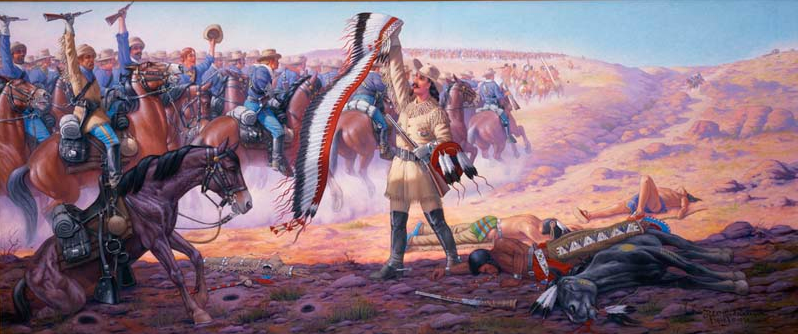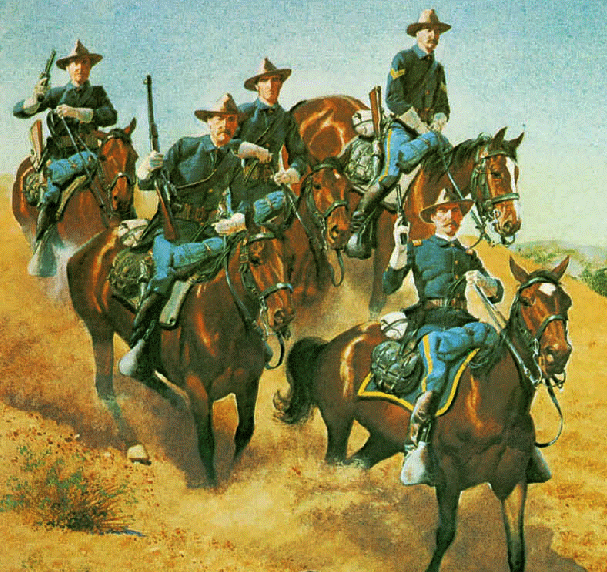Editor’s note: The following firsthand account of the Battle of Warbonnet Creek (July 17, 1876) is extracted from Campaigning With Crook and Stories of Army Life, by Captain Charles King (published 1890). The skirmish was fought in northwestern Nebraska between the U.S. 5th Cavalry Regiment and Cheyenne braves led by Chief Yellow Hand.
The chase of July 3d, besides killing two and using up a dozen horses, rendered our further presence in the valley of the Cheyenne clearly useless. No more Indians would be apt to come that way when they had the undisturbed choice of several others. General Merritt was prompt to accept the situation, and as prompt to act. Early the next morning, “K” and “I,” the two companies engaged in the dash of the day before, took the direct back track up the valley of Old Woman’s Fork, guarding the chief and the wagons. General Carr, with companies “B,” “G,” and “M,” marched eastward towards the Black Hills, while Major Upham, with “A,” “C,” and “D,” struck out northwestward up the valley of the Mini Pusa. Both commands were ordered to make a wide détour, scout the country for forty-eight hours, and rejoin headquarters at the head of what was then called Sage Creek. We of the center column spent the glorious Fourth in a dusty march, and followed it up on the 5th with another.
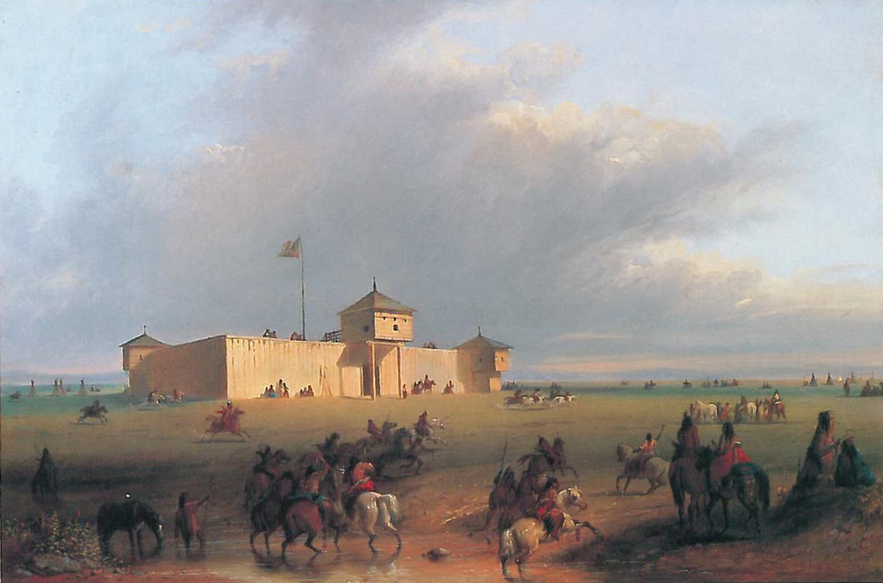
On the 6th, a courier was sent in to Fort Laramie, seventy miles away, while the regiment camped along the stream to wait for orders. Towards ten o’clock on the following morning, while the camp was principally occupied in fighting flies, a party of the junior officers were returning from a refreshing bath in a deep pool of the stream, when Buffalo Bill came hurriedly towards them from the general’s tent. His handsome face wore a look of deep trouble, and he brought us to a halt in stunned, awe-stricken silence with the announcement, “Custer and five companies of the Seventh wiped out of existence. It’s no rumor—General Merritt’s got the official dispatch.”
Now we knew that before another fortnight the Fifth would be sent to reinforce General Crook on the Big Horn. Any doubts as to whether a big campaign was imminent were dispelled. Few words were spoken—the camp was stilled in soldierly mourning. That night Lieutenant Hall rode in with later news and letters. He had made the perilous trip from Laramie alone, but confirmed the general impression that we would be speedily ordered in to the line of the North Platte, to march by way of Fetterman to Crook’s support. On Wednesday, the 12th, our move began, no orders having been received until the night before. Just what we were to do, probably no one knew but Merritt; he didn’t tell, and I never asked questions. Evening found us camping near the Cardinal’s Chair at the head of the Niobrara, in a furious storm of thunder, lightning, and rain, which lasted all night, and, wet to the skin, we were glad enough to march off at daybreak on the 13th, and still more glad to camp again that evening under the lee of friendly old Rawhide Peak.
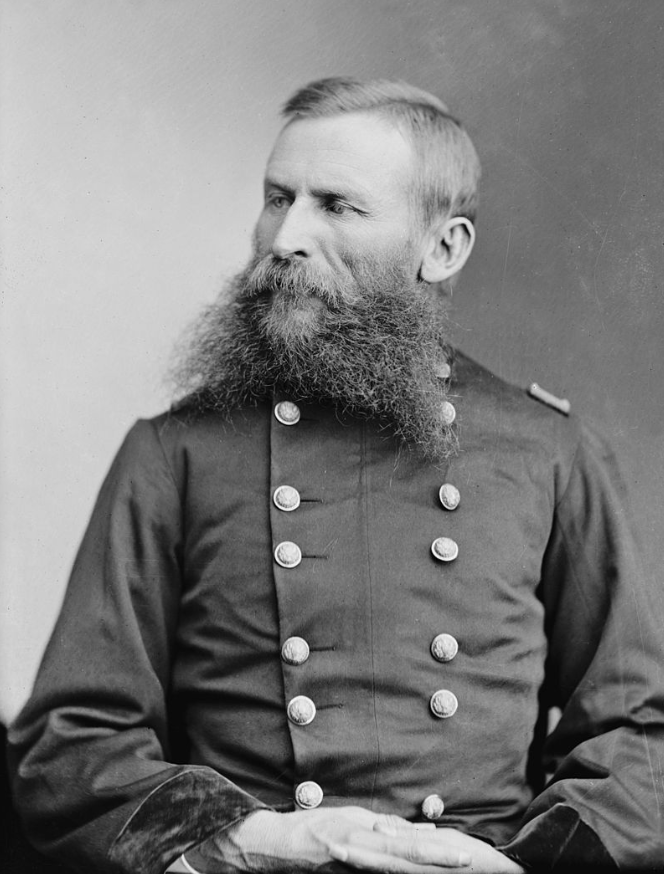
We were now just one long day’s march from Fort Laramie, and confidently expected to make it on the following day. At reveille on the 14th, however, a rumor ran through the camp that Merritt had received dispatches during the night indicating that there was a grand outbreak among the Indians at the reservation. Of course we knew that they would be vastly excited and encouraged by the intelligence of the Custer massacre. Furthermore, it was well known that there were nearly a thousand of the Cheyennes, the finest warriors and horsemen of the plains, who as yet remained peaceably at the Red Cloud or Spotted Tail Reservations along the White River, but they were eager for a pretext on which to “jump,” and now they might be expected to leave in a body at any moment and take to the war-path. Our withdrawal from the Cheyenne River left the favorite route again open, and the road to the Black Hills was again traversed by trains of wagons and large parties of whites on their way to the mines, a sight too tempting for their covetous eyes. Major Jordan, commanding the post of Camp Robinson, had hurriedly described the situation in a dispatch to Merritt, and when “Boots and saddles” sounded, and we rode into line, we saw the quartermaster guiding his wagons back over the ridge we had crossed the day before, and in a few minutes were following in their tracks. Away to the east we marched that morning, and at noon were halted where the road connecting Fort Laramie with the reservation crossed the Rawhide Creek. Here Captain Adam with Company “C” left us and pushed forward to the Niobrara Crossing, twenty-five miles nearer the Indian villages, while the indefatigable Major Stanton, “our polemical paymaster,” was hurried off to Red Cloud, to look into the situation. The rest of us waited further developments.
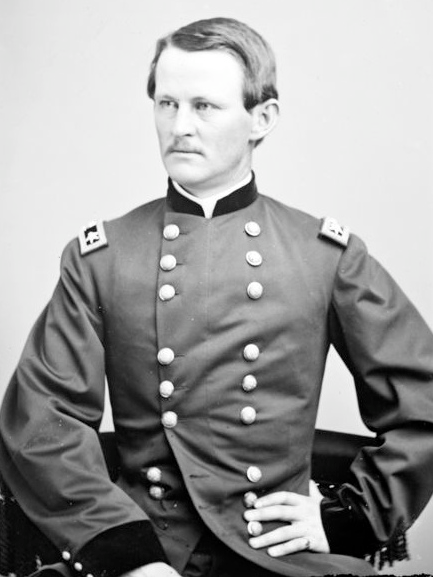
On Saturday, the 15th of July, just at noon, General Merritt received the despatch from the Red Cloud Agency which decided the subsequent movement of his command. It led to his first “lightning march” with his new regiment; it impelled him to a move at once bold and brilliant. It brought about an utter rout and discomfiture among the would-be allies of Sitting Bull, and, while it won him the commendation of the lieutenant-general, it delayed us a week in finally reaching Crook, and there was some implied criticism in remarks afterwards made.
In a mere narrative article there is little scope for argument. Merritt’s information was from Major Stanton, substantially to the effect that eight hundred Cheyenne warriors would leave the reservation on Sunday morning, fully equipped for the war-path, and with the avowed intention of joining the hostiles in the Big Horn country. To continue on his march to Laramie, and let them go, would have been gross, if not criminal, neglect. To follow by the direct road to the reservation, sixty-five miles away, would have been simply to drive them out and hasten their move. Manifestly there was but one thing to be done: to throw himself across their path and capture or drive them back, and to do this he must, relatively speaking, march over three sides of a square while they were traversing the fourth, and must do it undiscovered.
If Merritt hesitated ten minutes, his most intimate associates, his staff, did not know it. Leaving a small guard with the wagon train, and ordering Lieutenant Hall to catch up with us at night, the general and seven companies swing into saddle, and at one o’clock are marching up the Rawhide, away from the reservation, and with no apparent purpose of interfering in any project, howsoever diabolical, that aboriginal fancy can suggest. We halt a brief half-hour under the Peak, fourteen miles away, water our thirsty horses in the clear, running stream, then remount, and, following our chief, lead away northwestward. By five p.m. we are heading square to the north; at sunset we are descending into the wide valley of the Niobrara, and just at ten p.m. we halt and unsaddle under the tall buttes of the Running Water, close by our old camp at Cardinal’s Chair. Only thirty-five miles by the way we came, but horses must eat to live, and we have nothing but the buffalo grass to offer them. We post strong guards and pickets to prevent surprise, and scatter our horses well out over the hillsides to pick up all they can. Captain Hayes and I are detailed as officers of the guard and pickets for the night, and take ourselves off accordingly. At midnight, Lieutenant Hall arrives with his long wagon train. At three a.m., in the starlight, Merritt arouses his men; coffee and bacon are hurriedly served; the horses get a good breakfast of oats from the wagons, and at five a.m. we are climbing out of the valley to the north. And now, Messieurs les Cheyennes, we’ll see who first will bivouac to-night upon the War Bonnet. You are but twenty-eight miles from it; we are fifty to the point where your great trail crosses the little stream. The Sioux, in their picturesque nomenclature, called it after the gorgeous head-piece of bead-work, plume and eagles’ feathers, they wear in battle, the prized War Bonnet. The frontiersman, scorning the poetic, considers that he has fittingly, practically, anyway, translated it into Hat Creek, and even for such a name as this, three insignificant creeks within a few miles of one another claim precedence—and Indian and Horsehead creeks are placidly willing to share it with them.
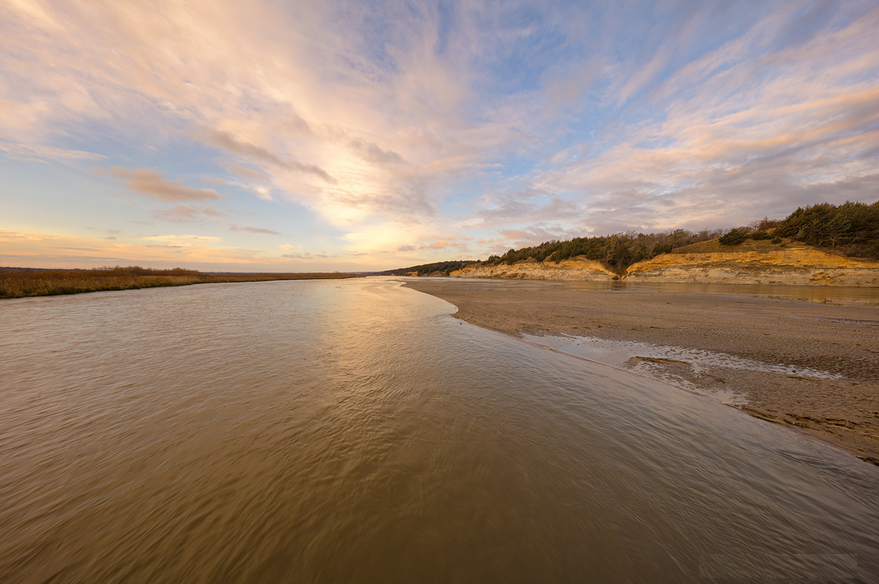
The sun rises over the broad lands of the Sioux to the eastward as we leave the shadowy Niobrara behind. Merritt’s swift-stepping gray at the head of the column keeps us on our mettle to save our distance, and the horses answer gamely to the pressing knees of their riders. At 10.15 we sight the palisade fortifications of the infantry company which guards the spring at the head of old Sage Creek, and Lieutenant Taylor eagerly welcomes us. Here, officers, men, and horses take a hurried but substantial lunch. We open fresh boxes of ammunition, and cram belts and pockets until every man is loaded like a deep-sea diver, and fairly bristles with deadly missiles. Then on we go. East-northeast over the rolling, treeless prairie, and far to our right and rear runs the high, rock-faced ridge that shuts out the cold north winds from the reservation. The day is hot; we are following the Black Hills road, and the dust rises in heavy clouds above us. But ’tis a long, long way to the Indian crossing, and we must be the first to reach it. At sunset a winding belt of green in a distant depression marks the presence of a stream. At eight p.m., silently under the stars, we glide in among the timbers. At nine the seven companies are unsaddled and in bivouac close under the bluffs, where a little plateau, around which the creek sweeps in almost complete circle, forms excellent defensive lair, secure against surprise. We have marched eighty-five miles in thirty-one hours, and here we are, square in their front, ready and eager to dispute with the Cheyennes their crossing on the morrow.
No fires are lighted, except a few tiny blazes in deep-dug holes, whence no betraying flame may escape. Horses and men, we bivouac in a great circle along the steep banks of a sluggish stream. The stars shine brightly overhead, but in the timber the darkness is intense. Mason, my captain, and I are just unstrapping our blankets and preparing for a nap, when Lieutenant Forbush, then adjutant of the regiment, stumbles over a fallen tree, and announces that Company “K” is detailed for guard and picket. I had “been on” all the night before with Captain Hayes, and would gladly have had a sound sleep before the morrow’s work; but when Mason, after reporting for orders to General Merritt, comes back and tells me that I am to have command of the outposts to the southeast, the direction from which the foe must come, there is compensation in the supposed mistake in the roster.
We grope out in the darkness, and post our pickets in hollows and depressions, where, should the bivouac be approached over the distant ridges, they can best observe objects against the sky. The men are tired; and, as they cannot walk post and keep awake, the utmost vigilance is enjoined on non-commissioned officers. Hour after hour I prowl around among the sentries, giving prompt answer to the muffled challenge that greets me with unvarying watchfulness. At one o’clock Colonel Mason and I, making the rounds together, come suddenly upon a post down among the willows next the stream, and are not halted; but we find the sentinel squatting under the bank, only visible in the starlight, apparently dozing. Stealing upon him from behind, I seize his carbine, and the man springs to his feet. Mason sternly rebukes him for his negligence, and is disposed to order him under guard; but old Sergeant Schreiber, who was never known to neglect a duty in his life, declares that he and the sentry were in conversation, and watching together some object across the stream not half a minute before we came upon them. Everywhere else along our front we find the men alert and watchful. At three o’clock the morning grows chilly, and the yelping of the coyotes out over the prairie is incessant. My orders are to call the General at half-past three; and, making my way through the slumbering groups, I find him rolled in his blanket at the foot of a big cottonwood, sleeping “with one eye open,” for he is wide awake in an instant, and I return to my outpost towards the southeast.
Outlined against the southern sky is a high ridge, some two miles away. It sweeps around from our left front, where it is lost among the undulations of the prairie. Square to the northeast, some twenty miles distant, the southernmost masses of the Black Hills are tumbled up in sharp relief against the dawn. A faint blush is stealing along the Orient; the ridge line grows darker against the brightening sky; stars overhead are paling, and the boughs of the cottonwoods murmur soft response to the stir of the morning breeze. Objects near at hand no longer baffle our tired eyes, and the faces of my comrades of the guard look drawn and wan in the cold light. We are huddled along a slope which did well enough for night watching; but, as the lay of the land becomes more distinct, we discern, four hundred yards farther out to the southeast, a little conical mound rising from a wave of prairie parallel to our front but shutting off all sight of objects between it and the distant range of heights, so I move my outpost quickly to the new position, and there we find unobstructed view.
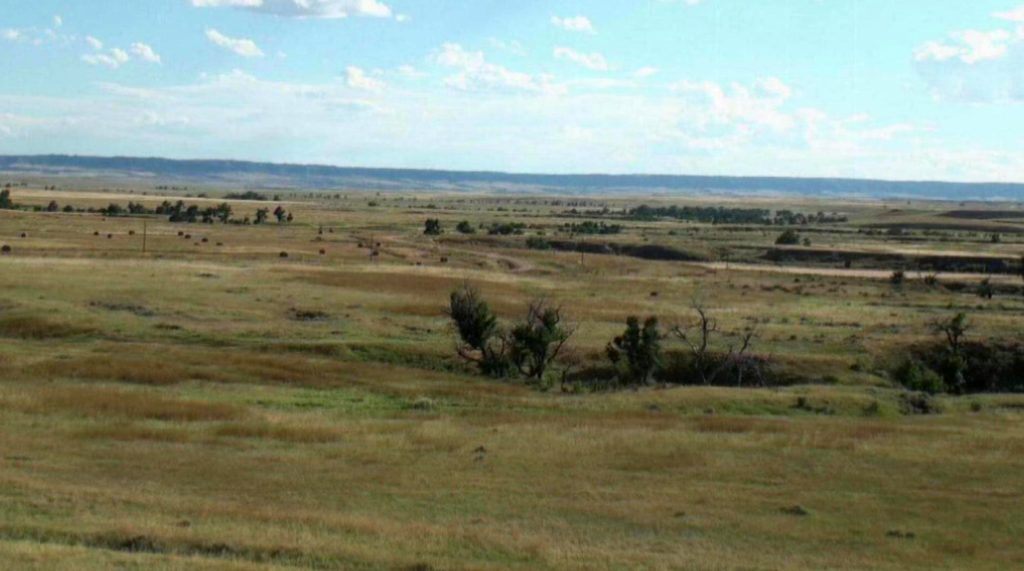
To our rear is the line of bluffs that marks the tortuous course of the stream, and the timber itself is now becoming mistily visible in the morning light. A faint wreath of fog creeps up from the stagnant water where busy beavers have checked its flow, and from the southward not even an Indian eye could tell that close under those bluffs seven companies of veteran cavalry are crouching, ready for a spring.
Turning to the front again, I bring my glasses to bear on the distant ridge, and sweep its face in search of moving objects. Off to the right I can mark the trail down which we came the night before, but not a soul is stirring. At half-past four our horses, saddled and bridled, are cropping the bunches of buffalo grass in the “swale” behind us; the four men of the picket are lying among them, lariat in hand. Corporal Wilkinson and I, prone upon the hill-top, are eagerly scanning the front, when he points quickly to the now plainly lighted ridge, exclaiming:
“Look, lieutenant—there are Indians!”
Another minute, and two miles away we sight another group of five or six mounted warriors. In ten minutes we have seen half a dozen different parties popping up into plain sight, then rapidly scurrying back out of view. At five o’clock they have appeared all along our front for a distance of three miles, but they do not approach nearer. Their movements puzzle me. We do not believe they have seen us. They make no attempt at concealment from our side, but they keep peering over ridges towards the west, and dodging behind slopes that hide them from that direction.
General Merritt has been promptly notified of their appearance, and at 5.15 he and General Carr and two or three of the staff ride out under cover of our position, and, dismounting, crawl up beside us and level their glasses.
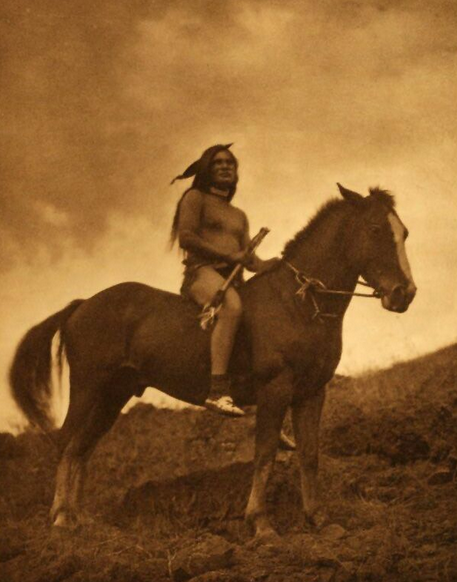
“What can they be after? What are they watching?” is the question. The Black Hills road is off there somewhere, but no travel is possible just now, and all trains are warned back at Taylor’s camp. At half-past five the mystery is solved. Four miles away to the southwest, to our right front, the white covers of army wagons break upon our astonished view. It must be our indefatigable Quartermaster Hall with our train, and he has been marching all night to reach us. He is guarded by two companies of stalwart infantry, but they are invisible. He has stowed them away in wagons, and is probably only afraid that the Indians won’t attack him. Wagon after wagon, the white covers come gleaming into sight far over the rolling prairie, and by this time the ridge is swarming with war-parties of Cheyennes. Here you are, beggarly, treacherous rascals; for years you have eaten of our bread, lived on our bounty. You are well fed, well cared for; you, your papooses and ponies are fat and independent; but you have heard of the grand revel in blood, scalps, and trophies of your brethren, the Sioux. It is no fight of yours. You have no grievance, but the love of rapine and warfare is the ruling passion, and you must take a hand against the Great Father, whom your treaty binds you to obey and honor. And now you have stuffed your wallets with his rations, your pouches with heavy loads of his best metallic cartridges, all too confidingly supplied you by peace-loving agents, who (for a consideration) wouldn’t suspect you of warlike designs for any consideration. You are only a day’s march from the reservation; and here, you think, are your first rich victims—a big train going to the Black Hills unguarded. No wonder you circle your swift ponies to the left in eager signals to your belated brethren to come on, come on. In half an hour you’ll have five hundred here, and the fate of those teamsters and that train is sealed.
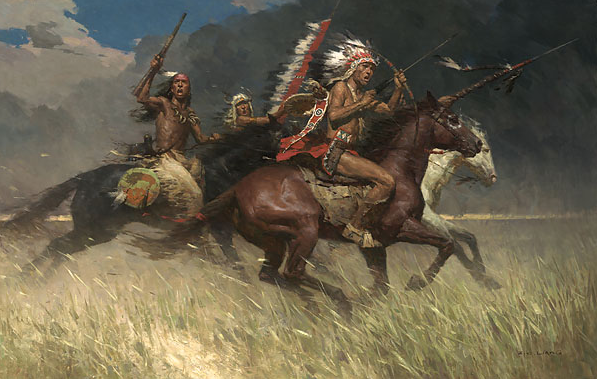
“Have the men had coffee?” asks General Merritt, after a leisurely survey. “Yes, sir,” is the adjutant’s report. “Then let them saddle up and close in mass under the bluffs,” is the order, and General Carr goes off to execute it.
The little hill on which we are lying is steep, almost precipitous on its southern slope, washed away apparently by the torrent that in the rainy season must come tearing down the long ravine directly ahead of us; it leads down from the distant ridge and sweeps past us to our right, where it is crossed by the very trail on which we marched in, and along which, three miles away, the wagon train is now approaching. The two come together like a V, and we are at its point, while between them juts out a long spur of hills. The trail cannot be seen from the ravine, and vice versa, while we on our point see both. At the head of the ravine, a mile and a half away, a party of thirty or forty Indians are scurrying about in eager and excited motion. “What in thunder are those vagabonds fooling about?” says Buffalo Bill, who has joined us with Tait and Chips, two of his pet assistants. Even while we speculate the answer is plain. Riding towards us, away ahead of the wagon train, two soldiers come loping along the trail. They bring dispatches to the command, no doubt, and, knowing us to be down here in the bottom somewhere, have started ahead to reach us. They see no Indians; for it is only from them and the train the wily foe is concealed, and all unsuspicious of their danger they come jauntily ahead. Now is the valiant red man’s opportunity. Come on, Brothers Swift Bear, Two Bulls, Bloody Hand; come on, ten or a dozen of you, my braves—there are only two of the pale-faced dogs, and they shall feel the red man’s vengeance forthwith. Come on, come on! We’ll dash down this ravine, a dozen of us, and six to one we’ll slay and scalp them without danger to ourselves; and a hundred to one we will brag about it the rest of our natural lives. Only a mile away come our couriers; only a mile and a half up the ravine a murderous party of Cheyennes lash their excited ponies into eager gallop, and down they come towards us.
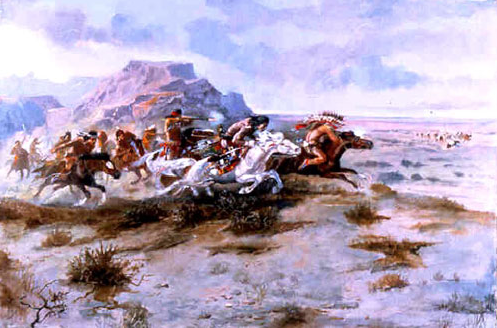
“By Jove! general,” says Buffalo Bill, sliding backwards down the hill, “now’s our chance. Let our party mount here out of sight, and we’ll cut those fellows off.”
“Up with you, then!” is the answer. “Stay where you are, King. Watch them till they are close under you; then give the word. Come down, every other man of you!”
I am alone on the little mound. Glancing behind me, I see Cody, Tait, and Chips, with five cavalrymen, eagerly bending forward in their saddles, grasping carbine and rifle, every eye bent upon me in breathless silence, watching for the signal. General Merritt and Lieutenants Forbush and Pardee are crouching below me. Sergeant Schreiber and Corporal Wilkinson, on all-fours, are half-way down the northern slope. Not a horse or man of us visible to the Indians. Only my hatless head and the double field-glass peer over the grassy mound. Half a mile away are our couriers, now rapidly approaching. Now, my Indian friends, what of you? Oh, what a stirring picture you make as once more I fix my glasses on you! Here, nearly four years after, my pulses bound as I recall the sight. Savage warfare was never more beautiful than in you. On you come, your swift, agile ponies springing down the winding ravine, the rising sun gleaming on your trailing war bonnets, on silver armlets, necklace, gorget; on brilliant painted shield and beaded legging; on naked body and beardless face, stained most vivid vermilion. On you come, lance and rifle, pennon and feather glistening in the rare morning light, swaying in the wild grace of your peerless horsemanship; nearer, till I mark the very ornament on your leader’s shield. And on, too, all unsuspecting, come your helpless prey. I hold vengeance in my hand, but not yet to let it go. Five seconds too soon, and you can wheel about and escape us; one second too late, and my blue-coated couriers are dead men. On you come, savage, hungry-eyed, merciless. Two miles behind you are your scores of friends, eagerly, applaudingly watching your exploit. But five hundred yards ahead of you, coolly, vengefully awaiting you are your unseen foes, beating you at your own game, and you are running slap into them. Nearer and nearer—your leader, a gorgeous-looking fellow, on a bounding gray, signals “Close and follow.” Three hundred yards more, my buck, and (you fancy) your gleaming knives will tear the scalps of our couriers. Twenty seconds, and you will dash round that point with your war-whoop ringing in their ears. Ha! Lances, is it? You don’t want your shots heard back at the train. What will you think of ours? “All ready, general?”
“All ready, King. Give the word when you like.”
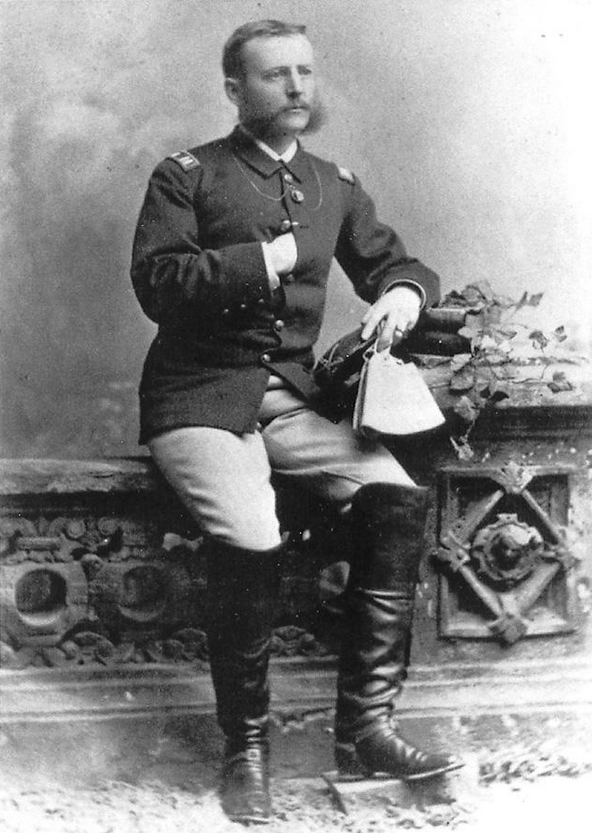
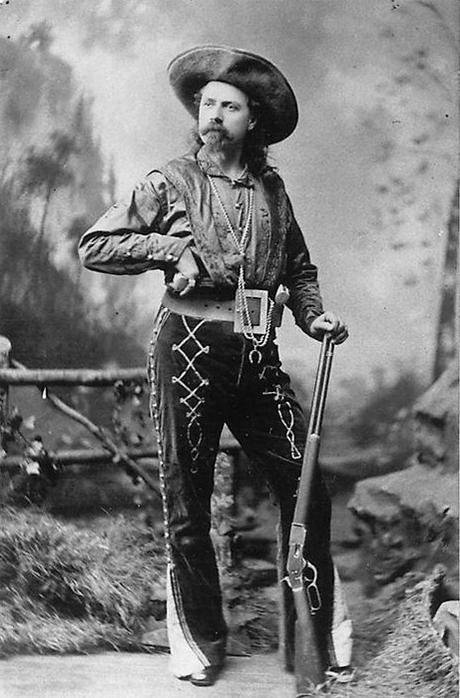
Not a man but myself knows how near they are. Two hundred yards now, and I can hear the panting of their wiry steeds. A hundred and fifty! That’s right—close in, you beggars! Ten seconds more and you are on them! A hundred and twenty-five yards—a hundred—ninety—
“Now, lads, in with you!”
Crash go the hoofs! There’s a rush, a wild, ringing cheer; then bang, bang, bang! and in a cloud of dust Cody and his men tumble in among them. General Merritt springs up to my side, Corporal Wilkinson to his. Cool as a cucumber, the Indian leader reins in his pony in sweeping circle to the left, ducks on his neck as Wilkinson’s bullet whistles by his head; then under his pony, and his return shot “zips” close by the general’s cheek. Then comes the cry, “Look to the front; look, look!” and, swarming down the ridge as far as we can see, come dozens of Indian warriors at top speed to the rescue. “Send up the first company!” is Merritt’s order as he springs into saddle, and, followed by his adjutant, rides off to the left and front. I jump for my horse, and the vagabond, excited by the shots and rush around us, plunges at his lariat and breaks to the left. As I catch him, I see Buffalo Bill closing on a superbly accoutred warrior. It is the work of a minute; the Indian has fired and missed. Cody’s bullet tears through the rider’s leg, into his pony’s heart, and they tumble in confused heap on the prairie. The Cheyenne struggles to his feet for another shot, but Cody’s second bullet crashes through his brain, and the young chief, Yellow Hand, drops lifeless in his tracks.
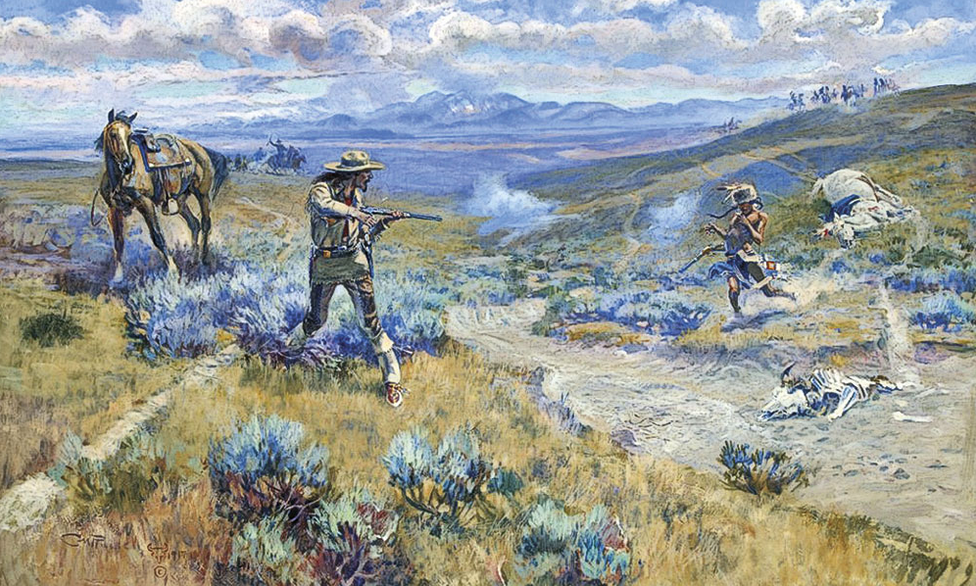
Here comes my company, “K,” trotting up from the bluffs, Colonel Mason at their head, and I take my place in front of my platoon, as, sweeping over the ridge, the field lies before us. Directly in front, a mile away, the redskins are rushing down to join their comrades; and their triumphant yells change to cries of warning as Company “K’s” blue line shoots up over the divide.
“Drive them, Mason, but look out for the main ridge,” is the only order we hear; and, without a word, shout, or shot, “K” goes squarely at the foe. They fire wildly, wheeling about and backing off towards the hills; but our men waste no shot, and we speed up the slope, spreading out unconsciously in open order to right and left. Their bullets whistle harmlessly over our heads, and some of our young men are eagerly looking for permission to begin. Now the pursued have opened fire from both our flanks, for we have spread them open in our rush; and, glancing over my shoulder, it is glorious to see Montgomery’s beautiful grays sweeping to our right and rear, while Kellogg’s men are coming “front into line” at the gallop on our left. We gain the crest only to find the Indians scattering like chaff before us, utterly confounded at their unexpected encounter. Then comes the pursuit—a lively gallop over rolling prairie, the Indians dropping blankets, rations, everything weighty they could spare except their guns and ammunition. Right and left, far and near, they scatter into small bands, and go tearing homeward. Once within the limits of the reservation they are safe, and we strain every nerve to catch them; but when the sun is high in the heavens and noon has come, the Cheyennes are back under the sheltering wing of the Indian Bureau, and not one of them can we lay hands on.
Baffled and astounded, for once in a lifetime beaten at their own game, their project of joining Sitting Bull nipped in the bud, they mourn the loss of three of their best braves slain in sudden attack, and of all their provender and supplies lost in hurried flight. Weary enough we reach the agency building at seven that evening, disappointed at having bagged no greater game; but our chief is satisfied. Buffalo Bill is radiant; his are the honors of the day; and the Fifth generally goes to sleep on the ground, well content with the affair on the War Bonnet.
